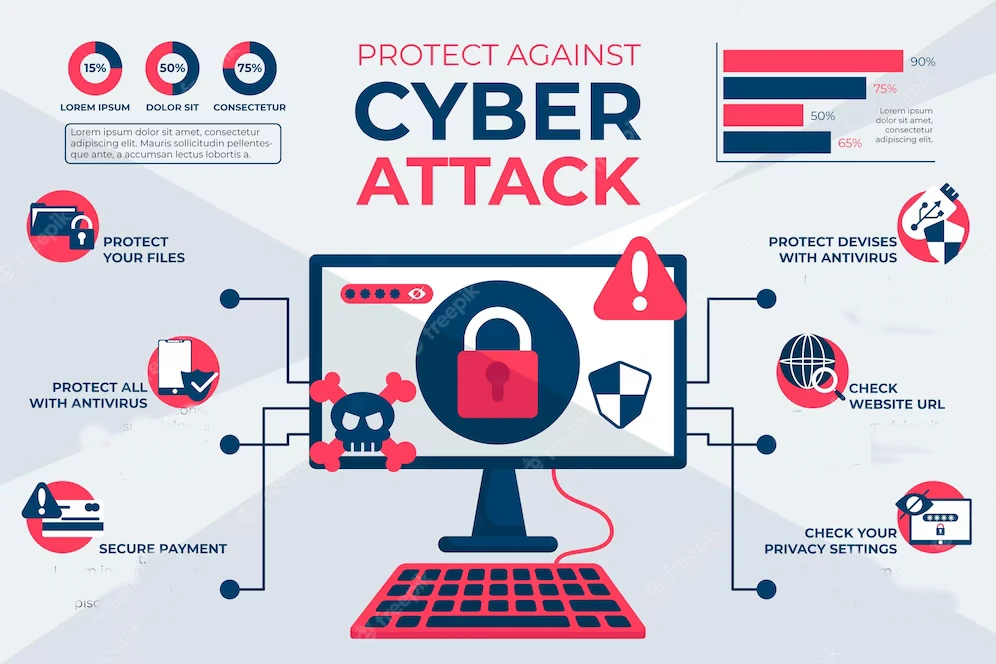In today’s global economy where there are rapid digital change, businesses interact with their customers either online or through social media and so has the risk of cyber attacks increased. Users can examine all recent changes, purchase goods or services, get in touch with the company’s representatives, and more by visiting the company website.

The company suffers huge reputational and financial damages when its website is offline. And dishonest competitors and unscrupulous agents are aware of it. Corporate websites are targeted by hackers to demand ransom payments or to harm rival businesses.
Sadly, hacking risks are becoming far more serious and sophisticated. The greater a company’s reliance on technology, the higher the stakes. Organizations may fortunately protect themselves from hackers in a variety of ways and safeguard sensitive data.
What is cyber attack?
An intentional and malicious attempt to compromise, disrupt, harm, or obtain unauthorized access to computer systems, networks, or digital devices is referred to as a cyber attack.
How Do I Protect my site from Cyber attacks?
Large organizations with strict security measures are affected by massive computer attacks. Hackers also target small firms, which could underrate the hazards of cybercrime and lack the funding to implement costly protection measures.
1. Make Regular Backups
The simplest way to prepare for a malware assault is to do this. Utilizing this tactic enables you to restore your website to its pre-attack state. This attack will not harm you at all if you are equipped with a trustworthy backup. Observe the fundamental guideline of preserving your data on a separate drive, either offline or online.
2 Regular Updating
A website’s security is typically improved with new upgrades to safeguard it from viruses and malware.
The new suite of programs increases website security by preventing repeated infections and cyberattacks by continually staying up to date on the most recent software.
3. Use a firewall
One of the greatest ways to stop a cyber assault is to turn on a firewall that will keep an eye on all of your computer’s incoming and outgoing traffic.
Activate your Windows firewall if your antivirus program does not come with one.
4. Install plugins for security and SSL
The installation of SSL and security plugins is one of the fundamental security measures to safeguard a website against hacking. As a result, the information sent from your website will be encrypted and only the targeted recipients will get it.
You can find out more on how to shop safely online here
5. Control the data that website visitors upload
If users must upload files, then you must specify the file sizes that are permitted as well as the permissible file extensions. Do not forget to scan the uploaded files as well because they can be infected with malware. In order to prevent a website’s functionality and the security of its data from being harmed even if submitted files include malware, they should be kept apart from the root folder.
6. Utilize website security software
To determine whether your website is susceptible to actual attacks, use specialized website security technologies that can simulate hacker attacks. Using firewalls to stop hackers from accessing websites is one of the most efficient ways prevent websites from hacking.
7. Select Reputable Web Hosting Providers
Select dependable web hosting companies that frequently do backups and check logs for activity from known unsafe hackers. In the event of a cyberattack, the accountable service provider will work with you right away to filter traffic. Examining a hosting provider’s history of security problems could possibly be relevant.
8. Implement Security Questions and Passphrases
Your maiden name, please. What movie is your favorite? Which animal was your very first? Such straightforward security queries can thwart an attack. And when it comes to blocking a cyberattack, passphrases made consisting of numerous complex words, digits, letters, special characters, and emoji are excellent.
How to Fix WiFi Connection Issues on a Laptop
9. Utilize a Secure Password
Your best line of security against a cyber assault is a strong password. Using a weak password will just make you a target. Use a solid password manager, make sure your password has a minimum of 12 characters, 1 uppercase letter, a few numerals, and is not a word from the dictionary.10.
10. Install antivirus protection and a malware scanner.
Some hackers with restricted access to your website might upload malware using a backdoor file to obtain the necessary data and bring your website to a halt. To safeguard, filter, and get rid of any viruses and malicious code on your website, it is advised to utilize a file-based, inside-out antivirus scanner/malware scanner.
11. Development & Monitoring of the Site
Instantaneously identifying every cyberattack is in no way simple. Checking your website at least once a day will help you avoid an attack. This provides you with an overview of the current cyberthreat.
12. Pass Standard Security Testing
Request security testing from trustworthy providers, such as penetration testing. In order to fix the current vulnerabilities and stop the creation of similar problems in the future, security engineers will test your web environment’s resistance to cyberattacks and will provide you with advice on what security enhancements you should do. This type of security check enables manual and methodical evaluation of a system to gauge the client’s capacity to stop website hacking.

Why should Companies Secure their Websites from Hackers?
Companies can avoid additional costly outlays necessary to restore the functionality of their websites/apps after breaches by securing their websites from hackers and viruses. Small and medium-sized organizations may be unable to recover from cyberattacks that target their websites due to the extent of the harm done. Additionally, search engines may ban websites that have suffered significant data breaches, which might significantly reduce the number of new customers that businesses receive.
Instead, when businesses safeguard their websites, they establish the framework for improved SEO performance. For instance, by putting DDoS prevention measures in place, businesses may stop malevolent bots from obstructing legitimate traffic to their websites.
By safeguarding their websites from hacking corporations, businesses can first and foremost safeguard the data of their users, including names, email addresses, credit card details, dates of birth, phone numbers, etc. Frequently, cybercriminals attack business websites in an effort to insert malware that would later be downloaded to customers’ devices. Customers are likely to quit applying for its services or purchasing its products due to a loss of confidence when they learn that a company has failed to securely keep their data.
By protecting their websites from hacking, businesses also enable core staff to concentrate on promoting business expansion and enhancing user experience rather than resolving security issues. The most valuable corporate asset is time, and one of the best ways for companies to protect that asset is by making sure their websites are secure.
Conclusion
In general, one of the major cybersecurity concerns confronting businesses from diverse industries is website hacking. The inability of a business to safeguard its website against viruses and hackers may have negative financial, reputational, and technical repercussions for this industry participant and, generally, damage its long-term competitiveness. Websites can be compromised using a variety of techniques and technologies, therefore businesses who place a high priority on protecting their websites from hackers should be aware that, without expert security providers, they risk underestimating the security of their web resources.
Identity theft, being blacklisted on a search engine, defacement, extortion, and being forced to pay ransoms are all common consequences of cyber attacks. Therefore, use any or all of the strategies listed above to secure your website against cyberattack.
